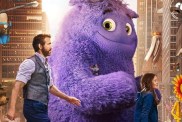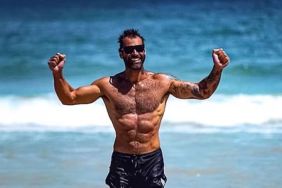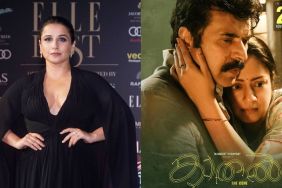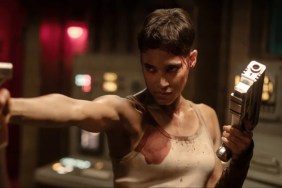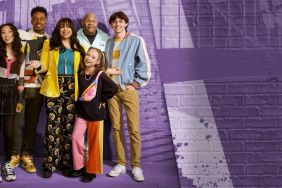Peter Morgan has established a reputation for himself as the go-to screenwriter for bringing famous events from recent history to the screen, as he did in his Oscar-nominated screenplays for Stephen Frears’ The Queen and Frost/Nixon, based on his own stageplay.
The drama Hereafter includes a couple of recent touchstones from the news, but it’s a different type of screenplay for Morgan. In fact, after writing the script a few years back, he put it in a drawer for six months, only to have it sent by his agent to producers Kathleen Kennedy and Steven Spielberg who in turn gave it to Clint Eastwood, who decided to make it his next project.
A film in three sections, it revolves around three individuals who have experienced death or the afterlife with Matt Damon as George Lonegan, a psychic who can contact dead loves who is trying to have a normal life. Cecile de France plays French journalist Marie LeLay, who had her own near-death experience and is trying to figure out what happened to her, while a young British schoolboy trying to overcome the death of his identical twin.
Having attended the film’s New York press conference a few days prior, ComingSoon.net still had a few questions for Morgan that we got to follow-up on with a phone call last week. (Note: Due to lousy cell phone reception, the sound quality during our interview wasn’t great, but we did the best to quote Morgan verbatim and only had to fill in a few blanks due to dropouts.)
ComingSoon.net: First of all, what was the time period for when you wrote this? At the press conference you mentioned having written this and then put it away.
Peter Morgan: I put it away actually for probably about six months, but I wrote it, put it away and had to continue doing paid assignments, and then my friend died, so I can tell you when that was, that was two-and-a-half years ago, so I probably wrote it about three-and-a-half years ago, put it aside for six months. That would be the timeline.
CS: I was curious about that, because there are real events in the movie, and I wasn’t sure if you wrote this roughly around the same time.
Morgan: It absolutely did not go that far back, no.
CS: When you first started this, was there always an idea to tell three separate stories or did that just come out of writing it because you had three characters or ideas? How did that come together?
Morgan: No, it started with the twins then I realized, “No, this needs to start somewhere else” and it sort of evolved very organically and became three people. Now, I wrote it exactly as you saw it or rather, I wrote it as it is, and sort of out practicality’s sake, always expected to just pick one of the three stories and focus on that, rather than do all three. I wrote it and then I thought, “Well, actually, we’ll probably never get enough money,” because working in England, who is going to pay to make a tsunami, for heaven’s sake? So I was shocked not only when Clint said he wanted to do it, but also that they’d do it exactly as it is, because I knew that would have certain cost implications.

CS: I was curious about that because the tsunami is such a big setpiece cost-wise, but the rest of the movie is fairly small and low-key, and I assume it could be done independently, the rest of the movie.
Morgan: That’s what I felt, and you’re actually right that way, because I just sort of think to myself that things that interest me in the things that I write are generally not tentpole pictures. They’re not obvious mainstream commercial movies so I try and write as modestly as I can. The tsunami was sort of an exception to that and I never really thought for one minute (it would be seen).
CS: You’ve worked with a lot of great directors so what is Clint like as a collaborator? I know he mentioned he liked the script as is and didn’t want any rewrites but you’re involved as a producer as well, so what was your capacity once he became involved?
Morgan: Actually, I honestly couldn’t even call Clint a collaborator because we didn’t really collaborate. We did collaborate in so far that he took my words and he directed them, but there was never really a period of time when we were both working on it together. It was very much I had written the script in Stage A and then he took the movie and directed it in some Stage B. Funnily enough, I’ve met him much more now that we’ve been talking about the movie, and I got to spend some time with him. I like him a great deal and he’s absolutely a lovely guy now that I’ve spent time with him and obviously, very inspiring.
CS: A lot of people are comparing this to “Babel” due to the multiple stories so while you were writing it and when you decided to do three stories, were there any concerns about being in that territory that Alejandro Iñarritu had done before?
Morgan: It didn’t occur to me at all, actually. I’ve written another script now, which I’m going to make with Fernando Meirelles, which works with even more storylines. It reflects a lot more of my new interests and the way that I move now, on the internet, in several different world cities at once. Like I said, I regularly spend my time in London, New York, and Los Angeles, and these are all cities with an enormous range of diversity in the sense of we are one planet and one big international space that’s a bit stronger. I live in a bilingual household and it reflects our normal reality rather than the abnormal.
CS: A lot of the stuff you’ve written has been either from historical or a news perspective and that’s the case here, too. I remember you mentioning that you became interested in this subject because you read books by journalists on the topic. You read work from people who approach it from a journalistic viewpoint rather than from the spiritual or religious.
Morgan: Yes, absolutely.
CS: How do you approach a movie like this from that standpoint?
Morgan: I don’t know your personal belief systems, but I approach it very typically in the same way that you or I would, empirically or scientifically. That’s the only way I have of approaching anything, I don’t know different in the way that you did, which in this case was mostly by book and the internet, too. Having said that, any attempt to explore this sort of material on the internet is very painful.
CS: Yeah, it was a bit of a shocker when I heard you didn’t do much research because it feels you’d have to do a lot of research to even get half this stuff right.
Morgan: Yeah, but actually, how do you research something that none of us know anything about? Actually, in the end, probably the safest place would be from your own experience, because if you go on the internet, oh my GOD. (laughs)

CS: One thing I like about your work and have always found it fascinating is that you do approach it like a journalist but you also get a lot of emotion in your work, which would seem to be cross-purposes to try to be factual and realistic but have the type of emotion that’s important for in order to move the audiences. Getting those two things to work together is very difficult.
Morgan: Yeah, well I can’t help the emotional part. I guess that’s just who I am, but I don’t read much fiction, I just don’t, and I have a sort of newshound vibe on a story but I don’t want to repeat myself. I’m not an artist and I want to take risks and when the possibility of failure occurs, it’s because the idea is all exciting or interesting as a highwire act and sometimes you’ve got to fall off, just by virtue of the fact that you’re constantly trying to evolve and do new things. So if I were to have a comfort line, I would probably work pretty journalistically all the time, but basically, there’s something else moving that comes out naturally which is about this modern sort of reality, because I started writing another story. It came to me immediately, writing this other movie, which hopefully you and I will be talking about maybe in a year’s time, which I’m going to make with Fernando Meirelles.
CS: I’m very excited about that movie, “360,” and I wanted to ask if that was in a similar vein, because he’s talked before about doing this big movie that encompasses the entire globe, and I’ve been waiting for him to make that kind of movie.
Morgan: Yeah, I’m really looking forward to it and it allows me to basically use the same sort of muscles as “Hereafter,” rather than “The Queen” or “Frost/Nixon.”
CS: It’s interesting to see you working with Fernando, because you’re also involved with the adaptation of John le Carré’s “Tinker Tailor Soldier Spy,” and Fernando adapted “The Constant Gardener.” I was curious how you were approaching the material compared to that film?
Morgan: I had to unfortunately stand down as the writer of “Tinker, Tailor.” I had written a script which got the Swedish director Tomas Alfredson on board, and then he wanted to carry it in a slightly different direction, and I didn’t have time to do that, so I said, “Why don’t you get some other people in and I’ll remain as a producer on the movie?” rather than get into the whole script arbitration nonsense – we don’t really do that in England. I would have loved to have carried on, but unfortunately, our schedules conflicted, and so a chap named Peter Strahm came in to do some work with the director.
CS: I remember when you said you had a script done, you were looking for feedback, and the movie just got made, so looking back and having seen the movie, is there anything you would have changed or done differently if given the chance?
Morgan: Always. Always, always, always. But then that’s the agony and that’s why it’s appealing to work in the theater because you can continue to do modifications and the text that you’ve written is organic and ever-changing, but in a movie, there’s a cut-off point and literally, the cut-off point for me came very early, because clearly Clint wanted to make the movie without any changes, and I’m just the kind of guy that would carry on changing until you literally rip the pen out of my hand. I could talk all day about things I would have changed but that’s not helpful now.

CS: I remember the last time I talked to you, you expressed interest in directing something, so is that still in your mind as something you’d still like to do?
Morgan: That’s become a bit of a nuisance. I don’t know why… was going to direct something and then my mother died so I didn’t, and I withdrew, and I haven’t been remotely interested in stepping back into that. I think I realized that if I were to direct something, I’d always want the writer standing close by me as sort of a co-pilot, and since I would always want to direct something I’d written, I wouldn’t have that and that would make it too much like an undemocratic dictatorship for me. I think there should be checks and balances, and I think the writer and director should check and balance on another.
CS: I don’t know how much you can talk about this, but as far as working on the James Bond script, how far had you gotten along before they pulled the plug? Did you have a finished script?
Morgan: No, no, no, I hadn’t gotten that far. I was working on an outline when they said, “We’re going to have to stop this process now,” and when it came to the point where I was going to commit to doing the Freddie Mercury film, I sort of discussed with my reps that it would probably take me out of all consideration and that’s what’s happened, and I wish them the best.
CS: So you’ve been working on the Freddie Mercury film for a while now, so are you taking a similar approach as “The Queen” or “Frost/Nixon” or anything else you’ve written?
Morgan: Yeah, it ought to be more like that and using those muscles, so I’m doing a lot of interviews and trying to get the voice and listening to a lot of tapes, so I can write his dialogue and so his dialogue sounds different from everybody else’s dialogue, so I’m spending as much time as I can with the existing Queen band members and I’m absolutely loving doing it.
CS: Growing up in England, Queen must have been fairly hard to avoid, so were you a fan of the band when you were growing up?
Morgan: No, I wasn’t a fan of theirs at all, but I’ve become interested in them simply through the process of writing about them. But I am loving writing about them and I’m now devoted to Queen. (chuckles) No, it’s good, it’s really good, I’m having a good time.
CS: This is a little different because Freddie’s no longer alive, whereas with the characters in “The Queen” and at least one half of “Frost/Nixon,” they were still alive… whether that’s good or bad.
Morgan: Trust me. Brian May and Roger Taylor are still very much alive. I’m meeting them and speaking to them all the time.
CS: Have you ever considered doing anything at all fantasy-based? Your scripts have been very much based in history or the news, but I was curious if you thought of doing something that didn’t require all the research and interviews you normally do.
Morgan: I’m not good at fantasy, no. I have been offered stuff and I can’t get my head around it. I’m afraid that I’m a real materialist, if you know what I mean. I need the reality and I need logic. I have German parents, maybe that’s it. I’m just not a fantasist. I don’t understand and don’t enjoy sci-fi, and it’s just that if people aren’t real and they don’t live in a real and recognizable society, I don’t understand what to do.
Hereafter is now playing in New York, L.A. and Toronto and will open nationwide on Friday.


